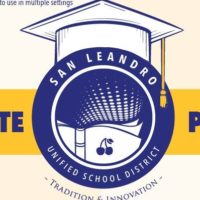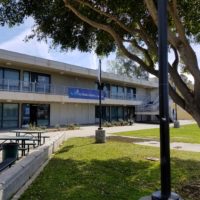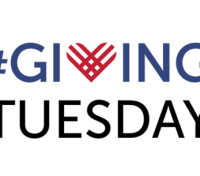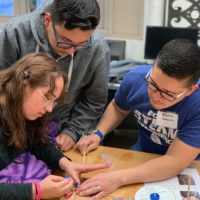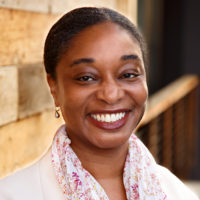As the COVID 19 crisis began to take hold in late March the disruption to our schools was unprecedented. While our field faced a crisis, we witnessed astounding stories of educators across the country responding with speed, compassion and care. As we listened closely to our partner districts, we at ConnectED realized that the core components of Linked Learning are more important than ever as we all work together to meet the basic, socio-emotional and academic needs of students.
To support our fellow educators, over the past few months ConnectED convened a series of webinars and virtual meetings. Our goal was simple: network educators from across the country, enabling them to share tools, resources and practices that are effectively meeting students’ needs, particularly students most impacted by both educational and economic hardships of COVID 19. Over 600 educators representing 29 states and 2 countries participated in our webinar series. A complete set of the resources and learning from the webinars can be found at www.ConnectEDNational.org/COVID-19. As a result, we learned a great deal from one another and wanted to take this opportunity to highlight a few key learnings:
- Relationships are foundational: Pathway teachers emphasized the importance of maintaining, building and cultivating relationships. Building in time for students to express their concerns, fears and needs within each virtual lesson allowed teachers and school administrators to support students basic needs, create engaging virtual learning experiences, and provide the socio-emotional support that adolescents need during this trying time. Small learning communities served as critical structures for enabling teacher and student relationship-building.
- We can prevent inequities from increasing: While the COVID-19 crisis has only exacerbated many of the systemic inequities in public education, that does not have to be the case moving forward. We heard stories of numerous ways that school districts, school leaders, and classroom teachers were innovating with a clear equity lens – from repurposing existing resources to provide students’ access to technology, to designing lessons that emphasized student voice, choice and autonomy, to engaging parents and families as essential partners.
- Graduate Profile is the “North Star”: The types of skills often incorporated into district Graduate Profiles (Communications, Collaboration, Critical Thinking, Creativity, etc) can be a primary focus for instruction during the crisis and provide coherence for educators.
- Integration helps Relevance: Even in a virtual learning environment Integrating core academics, Career and Technical Education, and Work-based Learning remains an effective strategy for engaging students and providing relevance in their learning. We heard examples of how teachers were reinforcing key concepts, providing opportunities to apply skills and knowledge, and connecting learning to a student’s lived experience through content integration.
- Engage the Community: Work-based learning can and should continue in a virtual learning environment. Business and Industry leaders want to be involved, and can be involved virtually, through activities like virtual job shadows, guest speakers,design challenges, and mentorship.
We offer this set of questions to school staff as plans are being devised that balance health, safety, academic learning, student engagement and student support:
- How might the pathways approach support closing the achievement gap as we extend the societal movement towards racial equality into our school systems?
- How can the pathways approach be leveraged to engage students in academic rigor while also paying attention to racial injustice and the real trauma students are experiencing?
- How can schools and districts leverage the pathways approach to keep students engaged in virtual learning?
- How might we center our students’ interests, current life experiences and resources in the design of virtual college and career pathways learning experiences?
- How might we integrate core content and Career and Technical Education in a virtual context to maximize opportunities for students to learn, apply and integrate academic knowledge and skills?
- How might this time be best used to shift from ‘seat time’ to competency-based outcomes for students, as well as grounding learning in student interest?
- How might we maintain business and community engagement and create even more meaningful experiences for students when it is likely most teaching will have to be done virtually? What are the best strategies to use, and how might we reimagine those relationships?
- How might we create partnerships with other institutions (e.g., churches, community centers, and recreation centers) in the community to support students? Can we use the remote teaching force to support students who need additional help?
In this moment, as districts across the country re-open this fall we have a choice: continue the status quo or re-envision new ways of learning and teaching. We choose the latter. We look forward to working with our partner districts to design learning and teaching experiences that center student voice, choice and autonomy, integrate core content, career technical education and work-based learning and wrap support, care and compassion around our students.
Learning from the Field During COVID
As the COVID 19 crisis began to take hold in late March the disruption to our schools was unprecedented.
We Will Learn and Heal Together
The past weeks have been wrought with the tragic murders of George Floyd, Breonna Taylor, and Dion Johnson. Moreover, there have been countless other cases of harm to and harassment of people in the black community as we saw with Christian Cooper in New York City. Most of these instances do not make it to the daily news, ignored testimony to how common racism and police brutality are in American life.
Should California create a Graduate Profile?
Would doing so drive shifts that more equitably and holistically prepare students for future success?
Transportation – Today and Tomorrow
How do you actually design and build a car? What are the main components of an electric vehicle? What does the future of the auto industry look like? Join us Tuesday, May 26 at 9:30am PDT for a conversation with one of the industry’s leaders, Marques McCammon, as he answers some of these questions, and launches a student Design Challenge.
This Teachable Moment
Nationwide, schools—from K-12 all the way through postsecondary institutions—are shuttering their doors. Government officials predict that schools are likely to remain closed for the next three to six months, through summer break. As parents, teachers, and students absorb the shocks and challenges of this new reality, many are wrestling with whether and how to sustain learning and teaching during these tumultuous times. In most respects, this is unprecedented. But in some respects, it is not.
Welcome Team Members
In order to meet the growing national demand for College & Career pathways, the ConnectED team is growing. We are excited to announce the addition of two new members to the ConnectED staff, as well as a new board member.
Experiential Learning as Valuable for Adults as It is for Students
The City of Long Beach needs to measure pedestrian traffic in the northwest quarter of the city. To assist the city, a team of seniors in the Academy of Advanced Manufacturing, Construction, and Engineering at Jordon High School are designing a device integrating infrared sensors, an electronic controller, and wireless communication.
Giving Tuesday
#GivingTuesday is here! We’re excited to participate in this inspiring day of giving back and hope that you’ll join in supporting the important work we are doing, work that prepares youth for successful lives in college and career via academically aligned Linked Learning pathways.
ConnectED Receives Multi-Year Grant
ConnectED is thrilled to receive a grant from The Bill & Melinda Gates Foundation to lead a 30-month partnership, led by Kiera Brodsky Chase and Jennifer Lutzenberger-Phillips, with Envision Learning Partners and the San Diego Unified School District (SDUSD). This project will pilot an integrated sequence of the Illustrative Mathematics (IM) curriculum in high school […]
A Leader Among Us: Daphannie Stephens
We are so very pleased to announce formally that Daphannie Stephens has taken on the position of Chief Program Officer at ConnectED. Daphannie joined ConnectED six years ago and during that time she led ConnectED’s coaching cadre, as well as our work in Detroit. A consummate coach herself, Daphannie brings so many important qualities to […]
)

